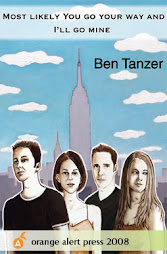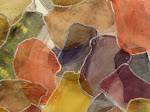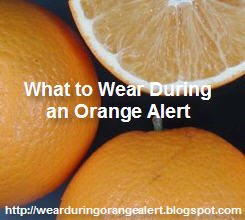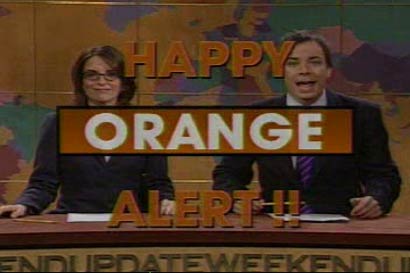
Katelyn Sack
What makes a thought a poem or a song or a painting? How does an artist decide a photograph is a painting and not a story about its subject? These small distinctions lay in the hands and in the mind of the artist, and there is nothing stopping some one from shifting a concept from on medium to another. In fact, expanding your creative output and trying to shift your focus may open up a blocked path or a whole new realm of inspiration. You may be able to make connections in a way you have never known existed.
Alabama's Katelyn Sack has the talent and understanding to move a piece between mediums, and at times may move one piece all the way though each medium. However, she uses her talent to break down paintings and move a piece into the genre that seems to fit. At times she paints, and then she may choose photography or poetry. Yet, if none of this works, she puts it to music. It must be a challenge, but one look through her portfolio and you can clearly see is up for it.
Recently, Katelyn was kind enough to answer a few of my questions.

Orange Alert (OA): I am amazed by the amount of mediums that you have your hands in, from painting to photographer to music to poetry and prose. If you had to pick one which would it be? Do you feel more comfortable in one medium vs. another?
Katelyn Sack (KS): There is definitely a synesthesia of creative expression that helps me keep from standing still. If one medium isn't flowing for me, I work in another, and it keeps me from being afraid. I am an over-analytical person, so it's very important for me to just keep moving, keep doing, keep making new mistakes and discovering new passions – or I'll question and plan myself out of existence.
If I had to pick one, it would be the one that I have to say is the most challenging, the one that takes the longest to get anything done in, the one that I'm obviously struggling with the most right now – which is creative writing in the realm of fiction. In my obsessive life plan, I'm supposed to have a baby and a book out by now, and I'm not even close to adopting or getting a short story published in The New Yorker!
OA: The general idea behind your 'Egress' project is extremely thrilling. How often do you take one piece through all mediums like you did with 'Egress'?
KS: I think probably this happens when I get stuck! If the song had flowed more immediately from the first few verses, instead of first morphing into a poem, and then giving me trouble in the realm of accompaniment, and then being hung up some more at press (in poem form) where I couldn't use an existing illustration to blog about the song when the illustration included some lines from the poem because that would render it previously published… Probably I would have already moved onto something else.
In other cases, memes or ideas are like songs – they get stuck in my head, and I just have to go at them until my muses have done their worst.

OA: Do you feel there is a difference in writing song lyrics and writing poetry? Do you approach them differently or are the songs poems put to music?
KS: It really depends on the poem. Many poems (like "Egress") come to me as songs, but only a few lines, and then I have to see what literary framework will work within the melodic one that exists in my head, or vice-versa. Alternately, I've written poems, illustrated them, and submitted them for years before realizing there's a melody and a music innate to the poem that I should make sure others can hear in it (as in "Linguist").
I suppose every song or poem is different for me. The song "Dear Mr. Lapham" actually sprang from an email I wrote the editor of the local (Charlottesville) newsweekly The Hook when he told me he couldn't give me a newspaper job because I didn't have weekly newspaper writing experience from college. From a college rag! I nicely explained to him that I had something far better – that I happened to be the CEO of my very own writing company, setting my own hours, conducting my own research, maintaining the discipline to get done what was most important to me... I didn't get a job, but a few years later, I realized my letter had a melody, and I could reapply the message to address the former editor of Harper's – to draw attention to how few female writers are able to break into mainstream journalism without becoming the token female writer who covers sex, gender, family, home décor... In Harper's, only one out of seven "meat" articles are written by women. This is only one example of what is the reigning pattern still in the (broadly defined) mainstream press, from The Atlantic to Salon.com. Of course in pointing this out as a female, I become that token female voice addressing gender issues. It's maddening.
OA: You maintain a blog called Visiopoetics where you talk about what is going on with your work etc. This could be considered self promotion. How far do you think an artist should take self-promotion? What are your limits?
KS: I don't see this as an issue of self-promotion, but rather one of communication. I think many artists and scholars, myself included, are introverts. We work alone even though in terms of ideas and cultural consciousness, we're very social creatures. The internet presents a way for artists and scholars to work independently while communicating effectively with the rest of the world on an everyday basis. This is cultural exchange; this is what it means to be present on the socio-political stage in the twenty-first century. (If 90% of life is showing up, showing up just got a lot easier!)
OA: You have very strong political beliefs. How did you get involved in writing for The Science Creative Quarterly? Do you feel artists are too often silent when it comes to voicing personal beliefs?
KS: Art and science come from the same will to appreciate what is – to stare in awe, to wrangle frameworks and facts into sense, and to convey what you perceive to others for the purpose of taking part in productive discussion. Political engagement is much the same animal. All three can fall prey to groupthink and the other, lesser demons of human society. But ultimately, the individual artist, scientist, and citizen gets to stare in awe, rush the beauty and chaos, and wrestle with her own ignorance and confusion again and again. It's not about being silent and still versus speaking up. It's about celebrating the truth, and seeking to improve what you can't celebrate.
OA: What's next for Katelyn Sack?
KS: I'm starting a PhD program in Politics at the University of Virginia this fall, and I'd really like to do some fieldwork abroad next summer. I'm dying to brush up my language skills and get out there, but it's difficult scheduling travel around family and professional obligations. So as always, I will see what opportunities present, and keep on moving.

Bonus Questions:
OA: Coffee? If yes, where do you go for your favorite cup?
KS: As a classical hedonist, I enjoy coffee AND tea every day. But I only drink coffee at home. I wish I could say I was a Luddite hermit or a strict fiscal conservative. But the truth is, I make the best coffee in town. No one else can compete.
OA: What type of music do you listen to? Do you listen to music while you paint?
KS: I love to bob my knees and sing while I paint. It keeps my spirits up, keeps me physically moving and energized, gives me different spatial perspectives on the canvas, and helps me tune out other environmental distractions. There is one local radio station that I can turn on and leave on for a painting binge, without going crazy with repeats: the independent 106.1 The Corner. They have savvy, creative programming, they plug progressive community events and local bands, and best of all, they're not Clear Channel. To paraphrase Dar Williams, I am out here listening all the time.
OA: BONUS bonus question! What do you wear during an orange alert?
KS: Red and yellow – so that when the lines start to blur, I'm perfectly camouflaged. Oh, yeah.
For more infomation on Katelyn Sack visit her website.
+by+Nick+Volkert).jpg)





















No comments:
Post a Comment